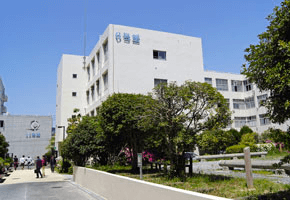Creation of chemical technology with aiming the harmony with nature and
ABOUT THE DEPARTMENT OF CHEMICAL ENGINEERING

The Department of Chemical Engineering at Fukuoka University was established in 1969, more than 40 years ago. A Master’s Degree program in chemical engineering was created in 1974.
NUMBER OF GRADUATES
More than 4,000 students have graduated from this department, and they play active roles in society.
FEATURES OF THE CURRICULUM
The department offers classes in fundamental education and experimentation, as well as classes in English communication and computers to respond flexibly to the needs of both the students and society. As part of their graduating thesis, students must perform research using the latest theories and investigate the creation and application of new functional materials.
FUNDAMENTAL EDUCATION AND EXPERIMENTATION
In the chemical systems engineering course, second-year undergraduate students learn specialized experiments and practices in chemical engineering. Third-year undergraduate students spend 9 hours a week performing experiments, through which they learn the basics of the reactors and reactions used in the chemical industry. Students may also have opportunities to visit and observe outside companies.
(A) ENGLISH, COMMUNICATION SKILL
If they are to play an active role in future society, students must be skilled in English communication and teamwork. First-year undergraduate students prepare poster presentations in cooperation with fourth-year students on the subject of “Chemical Engineering and Society”. Third-year undergraduate students search the foreign literature, write a report and give an oral presentation on the subject of “Reading Foreign Literature and Communication”. These experiences should be useful in various practical situations.
(C) COMPUTER EDUCATION
The department introduces students to the latest software on Chemical Reactions and Computational Fluid Dynamics.
(D) GRADUATION THESIS
Fourth-year undergraduate students are assigned to a laboratory and prepare a graduate thesis, which is presented orally in early February. They can also complete a graduation thesis based on research results.
CURRICULUM POLICY
Chemical engineering deals with a very wide range of subjects, including organic and inorganic chemistry, reaction control, and chemical devices. Therefore, graduates should be able to find work that interests them. The curriculum is arranged to address weaknesses, so that students are ensured to acquire basic academic skills. Unlike in high school independence is an important attribute for a university education, not only with regard to self-instruction, but also in terms of the need to reach out to the professor for help. Students should not hesitate to ask their professors for advice. If students make the best use of their professors, their campus experience should be fruitful.
ABOUT THE GRADUATE SCHOOL
The Master’s Degree program in chemical engineering was established so that students could obtain a deeper understanding of the material. Students in this program participate in special lectures based on knowledge at the undergraduate level and are challenged by leading-edge studies.
ABOUT JABEE
This department responded quickly to the educational reforms mandated when JABEE (Japan Accreditation Board for Engineering Education) was established in 1999. After various education models were pursued, this department received a JABEE Accreditation for “Chemical & Chemistry-Related Engineering” in 2002. While this authorization was dated April 15, 2003, it was applied to graduates as of March 24, 2003. The JABEE-accredited program is called the “Chemical engineering process course”, which has requirements that are somewhat different than those for graduation. A JABEE certificate of completion is conferred to students who fulfill the appropriate requirements. Moreover, graduates of JABEE-accredited programs are exempted from the first-step professional engineer examination and are qualified to be an Engineer-in-Training. In 1995, JABEE formally joined the Washington Accord, which is an international agreement among bodies that are responsible for accrediting engineering degree programs and recognizes the substantial equivalency of programs accredited by those bodies. JABEE-accredited programs are recognized by signatories of the Washington Accord, including the United States, Canada, the United Kingdom and other countries. Therefore, graduates of JABEE-accredited programs satisfy the requirements for working abroad. Additionally, this department is the first in Kyushu to be accredited for teaching “Chemical & Chemistry-Related Engineering”.
